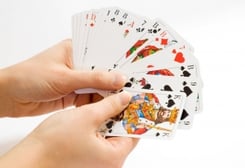Games can be more than just a fun way to pass time; they also offer a number of mental health benefits as well, encouraging socialisation, alleviating stress and keeping the mind sharp and active.
While we typically think of card and board games as child’s play, they joy of game play does not wear off with age. In fact, reconnecting with the more childlike aspects of yourself can improve your psychological outlook, and help manage conditions such as anxiety and depression. Playing games also keeps your mind sharp and active, which can help prevent memory-loss associated with older age. Take the time to explore all the different ways games can help you feel better.
Games Promote Socialisation and Help Build Relationships
With the fast paced, technology driven world of today, loneliness is an increasingly common experience. For people experiencing depression, anxiety or other forms of mental illness, this loneliness may be compounded by a tendency to isolate. Playing a game can make it easier for people to break the ice socially and can motivate you to spend time with others. Playing is in fact the first way we begin to socialise as children, and there is an organic and spontaneous element to building interpersonal relationships through games. Playing a game of cards or a board game helps conversation flow easily, encourages teamwork and fosters a spirit of friendly competition.
Reducing Stress Improves Your Overall Outlook
A third of Australians in the workforce report experiencing stress, anxiety and depression, which can have a negative impact on your physical, emotional and mental health. Taking time to relax and do something you enjoy is an important act of self-care. For many, a weekly poker night with friends or a family game night can help shift focus away from daily stressors, like work, bills and other personal challenges, onto a pleasurable and low-stakes task. Keep your game nights filled with laughter and chatter, and avoid playing for large sums of money to maximise the stress-reducing benefits of playing cards.
Games Keep Your Mind Sharp
Most card games involve some form of strategy, which exercise the minds problem-solving capabilities. With age, using different parts of your brain every day becomes increasingly important for preventing memory loss and dementia. Just learning the rules of a new game can encourage cognitive skills like memorisation and communication. A deck of cards can even be used to promote learning in other areas, for example, if you’re taking on a new language, incorporating a few phrases into your card game can give you a chance to practice and reinforce vocabulary words.
If you’re looking to explore a new hobby that benefits your mental health and social life, consider taking up a game of cards. Cards are an inexpensive way to spend time with friends and keep your mind happily occupied. By putting down your phone, turning off your TV and picking up a deck of cards, you can improve your psychological well-being.
